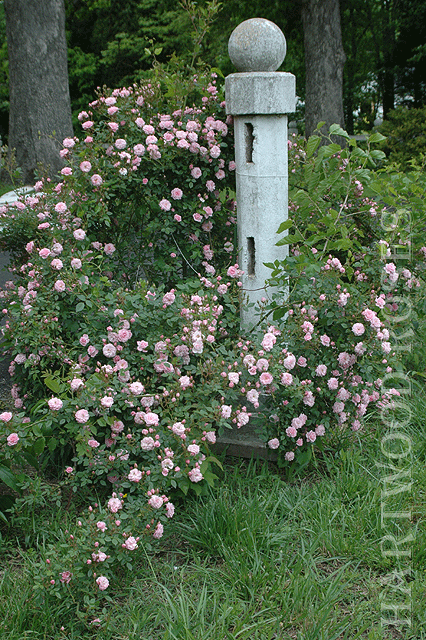Albertine
Rambler, introduced in 1921
If you've read this blog for any time at all, you know how much I love growing ramblers! They are easy care roses, that cover a lot of territory in a short amount of time ... and they produce a profusion of flowers in the spring that is without equal. Did I mention the fragrance?
"Cato's Cluster"
Noisette, found rose
Found roses are another category that is very dear to me. There's something romantic and thrilling about a unknown, beautiful rose discovered abandoned and neglected. These survivor roses are a joy to have in the garden.
"Grandmother's Hat"
Hybrid Perpetual, found rose
This is another found rose that does well here. When these roses are collected, they are given a study name to be used until the true identity is discovered. Sometimes (as with this rose) no match can be found among known roses, so the study name sticks.
"Natchitoches Noisette"
Noisette, found rose
This is the last of our found roses for this morning. I love the shading and veins in the flowers of "Natchitoches Noisette"! It usually send up shoots with loose clusters of these distinctive flowers.
Cornelia
Hybrid Musk, introduced in 1925
Cornelia is a well-mannered smaller climber, with fragrant, soft pink flowers, and few thorns. This photo shows that Cornelia is lovely, even laying on the ground after a storm.
Jeanne Lajoie
Climbing Miniature, introduced in 1976
I love this rose!! In spring, it is completely covered with clusters of these perfect petite pink flowers, and it continues to bloom off and on throughout the summer. Mine grows free-standing beside the fence, and it has formed a graceful, arching shrub about 6 feet high.
Here is a photo of what Jeanne Lajoie looked like this spring while we were replacing the boards on our fence.
Paul Transon
Rambler, introduced in 1900
This is another great rambler! (I may be a bit biased, because I think they're ALL great.) Paul Transon's canes are very flexible, making him particularly easy to train along a fence. Remember, the more horizontal the canes, the more flowers they produce.
New Dawn
Climber, introduced in 1930
New Dawn is one of the most popular roses in history ... a distinction that it very much deserves. If you have room in your garden for a disease-resistant climber, that blooms all the time, with fragrant flowers, New Dawn is a rose you should consider.
Pink Gruss an Aachen
Floribunda, introduced in 1929
Pink Gruss, as I call her for short, is a lovely, rounded, short-ish shrub that looks good in the landscape ... with glossy, dark green leaves and clusters of these distinctive pink flowers. They almost remind me of a combination of rose, a dahlia, and a camellia.
Marchesa Boccella
Hybrid Perpetual, introduced in 1842
Marchesa Boccella (also known as Jacques Cartier) has it all! Compact size? Check. Fabulous flowers? Check. Fragrance? Double Check!
All of the roses you see here this morning are available in the nursery, for you to add to your own garden if you want.
I rarely mention nursery sales here, because I try as hard as I can to keep my blog and my business somewhat separate. (I REALLY don't want you to come here and feel like I'm trying to sell you something ... that's a pretty serious turn-off.) Right now, though, sales here are really slow ... as they are with everything, I know. Most of us have limited resources, and roses are not really considered a necessary purchase. While my own roses in the garden are struggling in the heat, the potted roses for sale in the nursery look amazing. I work hard to make sure that they are healthy, and that they look their best to go to their new homes.
Please take a minute to visit a couple of friends of mine. Kat from Low Tide High Style is caring for an elderly dear friend, and Di, our favorite Blue Ridge Gal, said goodbye yesterday to her beloved Rottweiler, Missy. Each of these lovely ladies could use a little bit of company and encouragement.
(written by Hartwood Roses. Hartwood Roses blog.)





















